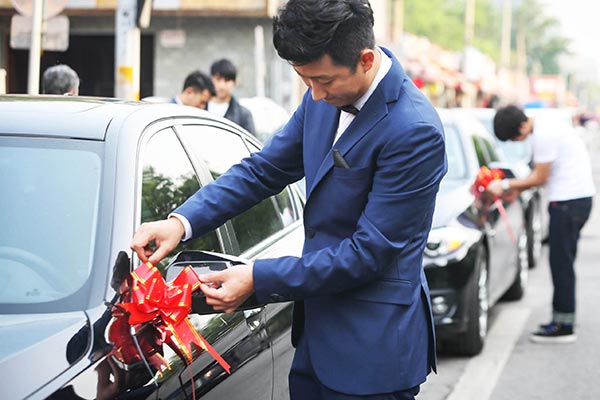A fleet of cars of UCAR Technology Inc, China's third-largest car-hailing company, is being prepared for a wedding in Beijing.[Provided to China Daily]
Deal with UCAR comes as the online ride-booking market is growing rapidly

The partnership will include online shopping, digital marketing, high-accuracy navigation and the development of smart vehicles, according to a joint-announcement from the two companies.
Alibaba also underlined it will not hold stakes of UCAR, an on-demand chauffeur service provider backed by the nation's biggest auto rental firm CAR Inc. The market has been expecting an Alibaba investment in UCAR since last year. Multiple media reports stated the investment could be worth more than 3 billion yuan ($460 million).
Charles Lu, chairman and CEO of CAR and the actual controller of UCAR, said in March he "has no plan" to raise investment before its initial public offering scheduled for later this year.
In late March, a financial leasing company of China Everbright Group provided a 20-billion-yuan line of credit of 20 billion yuan to UCAR for fleet expansion.
UCAR is aiming to be listed on a NASDAQ-style board for Chinese tech startups, Lu said.
Stocks of CAR, in which UCAR was the largest shareholder, jumped nearly 2 percent on Monday in Hong Kong, closing at HK$9.04 ($1.17).
Zhang Xu, a researcher from Beijing-based consultancy Analysys International, said UCAR is better positioned in the IPO competition comparing with Tencent Holdings Ltd-backed Didi Dache and Uber China, the Chinese subsidiary of Uber Technologies Inc, based in the United States.
"Didi is working on building its businesses in major cities by launching more diversified services, while Uber could not make profit out of China at the moment," said Zhang.
Alibaba has been eyeing a presence in China's online car-hailing market, where Tencent, Baidu Inc and LeEco Holdings Ltd all have claimed territories earlier on. UCAR is the only key player that is independent to internet majors including Tencent and Baidu.
Although Alibaba is also working with Didi, the Hangzhou-based company could not kick Tencent influence out of the board.
The growth for China's online car booking market is on the fast track. Due to rapid-growing demand for chauffeur services, turnovers in China's car-hailing market is set to hit 500 billion yuan by 2020, representing a year-on-year increase of 129 percent from 2015 to 2020, according to Roland Berger, a consulting firm.
Didi, Uber and UCAR were among the biggest booking platforms. Around 84 percent of users booked chauffeur services on Didi at the end of last year while 17.4 percent used Uber, according to Analysys International. UCAR was slightly behind, covering about 15 percent of the users.
The total percentage exceeds 100 percent because some passengers used more than one applications, said the firm.?
